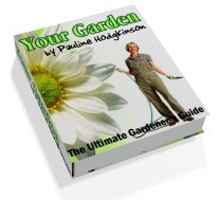 License Type: Resell Rights
License Type: Resell Rights  File Size: 742 KB
File Size: 742 KB File Type: ZIP
File Type: ZIP
 SKU: 16560
SKU: 16560  Shipping: Online Download
Shipping: Online Download
Ebook Sample Content Preview:
Organic Pest Controls: - Many of us who garden with the idea of working with nature, would choose to use products in our gardens that are safe or less harmful to the environment, ourselves and the creatures who live their lives in and around our gardens. We hope to avoid substances that destroy indiscriminately, choosing commodities instead that are destructive to specific elements only. Wherever possible we try to harness organic methods in the upkeep and cultural processes in our gardens.
Pesticides may also kill beneficial organisms, which serve important functions such as controlling pests, providing nutrients to the plants and aerating the soil. This disrupts the natural ecological balance between the beneficial and destructive organisms and encourages more pest and disease attack. This drives the need for even more pesticides and fungicides and so begins a cycle of dependence. These chemicals can be effective but generally only in the short term and persistent problems usually mean the plants are ‘stressed’ and trying to survive in an unhealthy environment.
By creating a good environment in the way of soil improvement, good horticulture practises to sustain healthy well-developed plants, will go a long way to enable the plants to better withstand pest and disease attacks. Variety helps the balance, stick with one type of plant massed into a single area and you are inviting trouble. Vary your planting and this will control the population explosion of many pests.
In our bid to control or eliminate those creatures and disease which damage or ruin our crops, we must look to enhance the environment, encouraging natural predators, companion planting schemes and setting up physical barriers, we are able to avoid strong chemicals the limit of their destructive influences we do not necessarily completely understand. It is of course a long-term approach but one that can only benefit both the environment and us.
In some cases the attacks on our plants may be sporadic and unpredictable, but most of the more serious pest attacks can be expected to cause damage to certain plants year after year. Often the severity of the attacks depends on the weather conditions. A mild, wet autumn is often followed by a severe infestation of leatherjackets in the spring, and hot weather is ideal for the explosion of the greenfly and other aphid populations.
An important factor is to learn to recognize the more common pests and be able to differentiate between pests and their predators so that we can encourage the latter to live in or visit our gardens. Organic gardening relies on several overlapping strategies rather than the power of a single highly toxic chemical to kill the pests. We must encourage the pest’s natural enemies such as ladybirds, lacewings, spiders and tiny parasitic wasps. Many beneficial insects that feed on garden pests need nectar and pollen for food during part of their lifecycle. Growing a year-round supply of suitable flowers close by will maintain the insect populations throughout the year. Keep the insect eating birds visiting your garden by providing them with safe nesting sites, offer safe hiding places for frogs and hedgehogs.
Biological Control of garden and greenhouse pests is becoming more and more popular with professional and amateur gardeners and used in the right way and at the right time it is an alternative to chemicals, effective and yet safe for children, pets and wildlife.
Herbal Sprays- Many organic gardeners are familiar with using sprays made from aromatic herbs to repel pests from the garden plants. Several recent studies confirm the repellent effect of such sprays.
The essential oil of Sage and Thyme and the alcohol extracts such as Hyssop, Rosemary, Sage, Thyme, and White Clover can be used in this manner. They have been shown to reduce the number of eggs laid and the amount of feeding damage to cabbage by caterpillars of large white butterflies. Sprays made from Tansy have demonstrated a repellent effect on imported cabbageworm on cabbage, reducing the number of eggs laid on the plants. Teas made from Wormwood or Nasturtiums are reputed to repel aphids from fruit trees, and sprays made from ground or blended Catnip, Chives, Feverfew, Marigolds, or Rue have also been used by gardeners against pests that feed on leaves.
- File Size:742 KB
- License: Resell Rights
- Category:Ebooks
- Tags:2008 Ebooks Resale Rights








